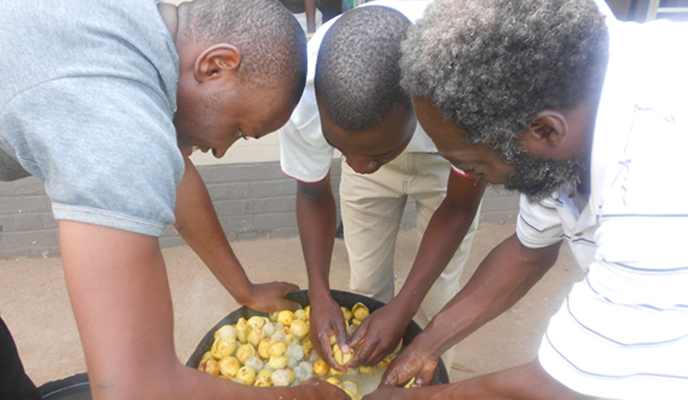
Closing the gap between what is known and what is done in agriculture and rural development remains a challenge for many developing countries. Although it is known that agricultural and rural development practices should be based on solid evidence, many people continue to rely on their gut feelings for important decisions and judgment.
BY CHARLES DHEWA
One of the reasons is that ICTs are churning out far too much information than can be absorbed and converted into useful decisions. As a result, many agricultural and rural development interventions have achieved modest success. On the other hand, the African formal education system assumes if good research is available and communicated well, farmers, traders, consumers and policymakers will act on it. The fact that this is not happening calls for the need to re-examine existing agricultural evidence and current knowledge sharing methods. Designing effective ways of moving knowledge into action is becoming one of the most important activities.
Beyond translation from English or French to vernacular languages
It is important to look at knowledge translation as a process that goes beyond translating information from English to Shona, Sotho, Swahili, Herero, Ndebele and other vernacular languages across Africa. The form of knowledge translation being presented here is about surmounting disciplinary boundaries. For instance, agricultural economists should be enabled to speak to nutritionists. Agriculture and public health should speak to each other eloquently. This can happen through dynamic processes of synthesising and promoting the exchange of knowledge. These processes should take into account complex interactions between researchers, farmers, traders, consumers, policymakers and ordinary people, depending on the needs of each group.
 Researchers trying to move from knowledge to action in agro-processing
Researchers trying to move from knowledge to action in agro-processing
A knowledge translation budget should not just focus on translating information from English or French to local languages, but enhancing knowledge exchange between various knowledge producers and users. While the United Nations system seems to focus on translating information into six or so colonial languages, authentic knowledge sharing in developing countries goes beyond these languages. Unfortunately, policymakers and development partners are yet to dedicate funds for knowledge co-production between researchers and communities. Moving from guidelines, publications and dissemination workshops to principles remains another grey area.
Competing sources of knowledge
- Chamisa under fire over US$120K donation
- Mavhunga puts DeMbare into Chibuku quarterfinals
- Pension funds bet on Cabora Bassa oilfields
- Councils defy govt fire tender directive
Keep Reading
Although formal knowledge systems emphasise evidence gathered through formal scientific research processes, farmers, traders and many communities are exposed to diverse competing sources of data and evidence. Some of the relevant evidence includes local data such as administrative information, evaluation findings on the use of natural resources like forests in a particular ward as well as the culture and priorities of a particular community. Farmers and communities also now seem to be aware that formal crop and livestock research happens independent of each other. As a result, the majority of farmers, who engage in both crop and livestock production, do not get satisfactory answers. Both formal and informal research reveal pros and cons of many agricultural practices such as contract farming, conservation agriculture and industrial agriculture. Lack of a firm concrete answer in terms of what works better than the other shows contradictions, which farmers often reflect about and combine with their practical wisdom.
The frustrating disconnect between knowledge production and its implementation
Research questions cannot continue to be driven solely by the curiosity of researchers but consider the capacity of users to take up the new knowledge. Failure to address the most important problems facing farmers and other agricultural actors is the main reason why some research results are never demanded and used. There is need for engaged scholarship, where researchers, practitioners and communities leverage on their different perspectives to generate useful knowledge. Simply disseminating knowledge to potential users of that knowledge after the research has been completed is likely to be of limited effect even if multiple and creative methods are used. Dissemination is too late if the questions that have been asked are not of interest to users such as farmers, traders and consumers.
There is a strong view among farmers and traders that knowledge must not only be scientifically valid, but also socially robust. Research has to be driven by issues of concern to the larger society rather than focusing on single issues of interest to academics and their silos. The disconnect between production of knowledge and its implementation has resulted in many agricultural value chain actors being frustrated with the limitations of academic approaches to knowledge generation and the focus on one-way dissemination of research findings. Since many farmers and agricultural actors have not been empowered to speak back to scientists, very few can demand relevant knowledge from formal researchers.
One of the reasons there is little progress in agriculture and rural development is that researchers continue to treat all problems as linear. Yet most agricultural challenges do not have a clear cause-effect relationship. Small things like wildfires can have a big impact on the environment and agricultural production. All these complex problems cannot be solved by researchers working in discipline-specific silos or without the insight and expertise of farmers and other actors. Most of the time farmers and rural people are treated either simply as data sources during the research process or passive and obedient recipients of information that is disseminated to them. Both researchers and knowledge users should collaborate in identifying pressing research questions and conducting research that is integrated with contextual evidence. [email protected]/[email protected] / [email protected]
Website: www.emkambo.co.zw/www.knowledgetransafrica.com
eMkambo Call Centre: 0771 859000-5/ 0716 331140-5 / 0739 866 343-6











